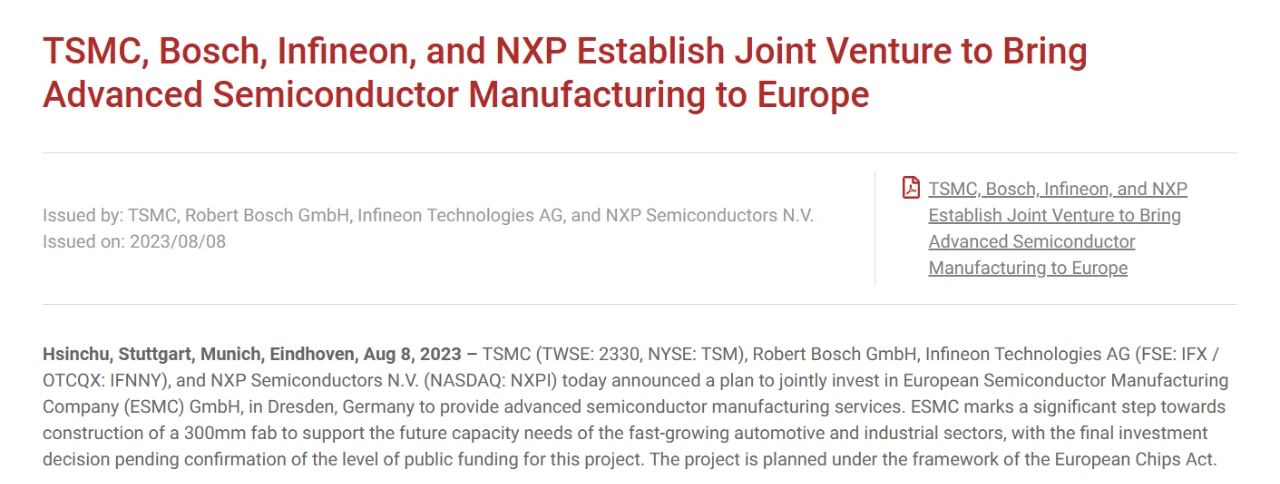TSMC official announcement: Joint venture with Infineon, NXP, and Bosch to build a factory
TSMC has officially decided to go to Germany to set up a joint venture with Bosch, Infineon and NXP.The investment amount exceeds 10 billion euros
TSMC issued a statement on August 8 that the company’s board of directors has approved a plan to invest in a semiconductor factory in Dresden, Germany. It will jointly establish ESMC, a joint venture company with Bosch, Infineon and NXP, and approves an investment of no more than 3.99993 billion in ESMC. TSMC will hold a 70% stake in the joint venture, while Bosch, Infineon and NXP will each hold a 10% stake.

The German fab is operated by TSMC, and the total investment is expected to exceed 10 billion euros. It is planned to start construction in the second half of 2024 and start production at the end of 2027.
TSMC said that ESMC's 12-inch fab construction plan has taken an important step, which will support the rapidly growing future capacity demand in the automotive and industrial markets. The fab is expected to adopt TSMC's 28/22nm planar complementary metal oxide semiconductor (CMOS) and 16/12nm fin field effect transistor (FinFET) process technology, with a monthly production capacity of about 40,000 12-inch wafers.
There are two major challenges in setting up a factory in Germany
Industry insiders believe that the largest proportion of TSMC's revenue is the US market, accounting for 68% in 2022; the European, Middle East and African market accounts for about 5%. It is necessary to set up a factory. However, based on the investment environment in Europe, TSMC may face the two major challenges of cost and labor unions.
Liu Peizhen, a researcher and director of the Industrial Economics Database of the Taiwan Institute of Economics, pointed out that due to the high construction costs and unstable energy prices of Intel's German plant, the construction plan of the plant has been delayed, and the investment amount has also increased to 30 billion euros. It is expected that TSMC will also face high costs when setting up a plant in Germany. challenge.
In addition, labor unions will be another challenge that TSMC may face when setting up a factory in Germany. Liu Peizhen said that TSMC has already faced the problem of cultural differences when going to the United States to build a factory. In the future, it will face a stronger labor union in Germany. How to overcome this problem will test the wisdom of TSMC's management.
However, the existing local semiconductor factories in Germany have a supply chain foundation, and they are not completely starting from scratch, which will help accelerate TSMC's German factory construction and future operations; in addition, there are car factories in the surrounding area, which is conducive to TSMC's expansion of the car power market.
Secondly, TSMC's German factory and Japanese factory also adopt a joint venture model. On the one hand, it can share risks with local players, and on the other hand, it can strengthen the cooperative relationship with customers.
Germany is currently actively promoting the domestic semiconductor manufacturing industry. Earlier reports pointed out that Germany plans to allocate 20 billion euros (about 22 billion U.S. dollars) to support Germany's semiconductor manufacturing industry. The move is aimed at propping up Germany's technology sector and securing supplies of key components.
The money will come from the Climate and Transition Fund (KTF) and will be distributed to German and international companies until 2027, according to a person involved in the negotiations. In addition to subsidies for TSMC, Intel has received 10 billion euros in subsidies and has finalized plans to build a chip factory in Magdeburg, eastern Germany.
---End---

